This post is the first in an 8 part series that I will write about implementing reading workshop into your classroom.
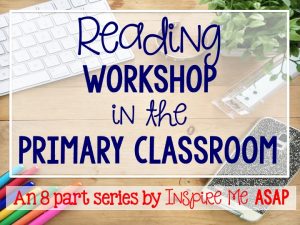
Today, for my first post in this series, I will write and introduction about reading workshop and dive further into the different components of reading workshop as the weeks progress.
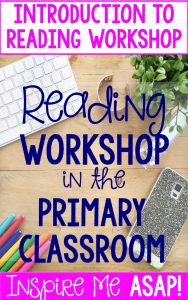
To say that I am passionate about reading instruction is an understatement. As a classroom teacher for more than 14 years, I have seen the pendulum swing from different reading initiatives, programs, and basal series. Implementing a workshop approach to teaching reading (and writing and math, for that matter!) is one of the single most important factors that literally transformed my teaching. It was only about 5 years ago that I started to learn about and implement a reading workshop approach in my classroom.
Let me paint you a picture of what you might observe if you walked into my classroom during reading workshop:
A group of about 25 third graders are gathered together and sitting on a carpet area in front of me. I am sitting next to my anchor chart and begin reading workshop by teaching a 15 minute mini-lesson. During this explicit teaching time, I am rereading a portion of our mentor text. I refer to a passage in the text that connects to the reading strategy or skill that I am teaching. My students “turn and talk” to the their partner and share what they are thinking and feeling. As my students settle back to their desk, they already have out their reader’s notebook and book nooks.
As students go back to their seats, they know exactly what the expectations are and no time is wasted. They write today’s date and reading workshop mini-lesson inside their reader’s notebook. Students begin reading books from their book nook, which they self-selected from the classroom library on their assigned shopping day. As my students are reading and writing about their reading in their reader’s notebooks, I am walking around the classroom and visiting with each table. Depending on the day, I may hold reading conferences, a guided reading group, or a reading strategy lesson group. I may hold a few reading conferences and give a compliment to the reader, while also providing feedback on what they can improve on. After about 35 minutes of independent reading time, I announce that book club will begin meeting in 5 minutes. Students look through their book club booklet, making sure they are prepared for their meeting. Book clubs meet and discuss their assigned reading, through student led discussions, for about 15 minutes. During this time, I am walking around the classroom, briefly “listening in” to each book club. I am making my own anecdotal notes about the progress of each book club. I announce that book clubs are concluding in a few minutes, and to wrap up their meeting.
Students come back to the carpet for closing of reading workshop, which lasts about 5 minutes. I conclude the lesson by reviewing the mini-lesson and referring back to my anchor chart. I highlight the work of one book club, providing specific feedback of what they did that was successful. Students briefly “turn and talk” to their neighbor, sharing how the book they read during independent reading was connected to the day’s mini-lesson.
I am the first to admit, it was not all rainbows and butterflies when I first started to implement a workshop approach. Let me rewind and explain how I got to this point….
My first few years of teaching first and second grade, I used literacy centers. All of my focus was on learning how to implement guided reading groups effectively and I did not have enough time and energy to learn about the best, most effective practices that the OTHER students should be engaged in.
I spent LOTS of money at Lakeshore Learning and other teaching stores buying commercialized products for my students to be “engaged in.” I spent lots of time writing grants to fund the literacy centers. I spent lots of time cutting, gluing, stapling, and getting ideas online for how to make cute centers. I had parent helpers, family members…EVERYONE helping me create centers. I made several different center charts and center rotations and experimented with which one worked best. I spent a lot of time teaching the directions and behaviors that I expected when the students were at literacy centers. My students seemed to like these activities. They liked interacting with their peers and liked having choices about what they were working on that week.
However, after a few years, I began to question all the time, money, and energy I was spending on centers and wondered if there was a better/easier/more effective way. I was getting the hang of this guided reading thing, even getting pretty good at it, and was ready to tackle the “what the other students are doing” issue. Were they really engaged in reading?? I was beginning to have these thoughts that I did not like pop into my head…how could I just “get rid” of everything that I spent so much time on!?! What other options were there?? After researching and observing what other teachers did with their students during reading, I found that there was something called “reading workshop.” I didn’t really understand it at first and was pretty skeptical. Unfortunately, my district (at that time) did not provide any professional development about a reading workshop approach to teaching reading. In fact, my district expected that our students be “engaged in literacy centers” and did not seem to support my **new** thinking about a workshop approach. So, I started to spend my money on awesome teacher resource books and I started to spend my time reading those books!
Fast forward to my where I am right now in my career. Instead of implementing reading workshop with my OWN students in my OWN classroom…I am helping other teachers implement reading workshop in THEIR classroom with THEIR students. As an instructional coach, I have the awesome opportunity and privilege to work personally and intensely with teachers. I will be first first to admit that implementing a workshop approach to teaching (any subject) can be a challenge. An exhausting, wondering “is this worth it?” thinking, challenge.
It is my hope that in this 8 blog post series, I can give you guidance about what reading workshop is and what it looks like when implemented correctly.
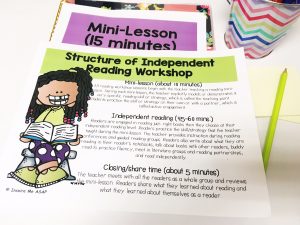
First up, let’s talk about the actual structure of reading workshop.
There are three main components of reading workshop: the mini-lesson, independent reading, and closing/sharing.
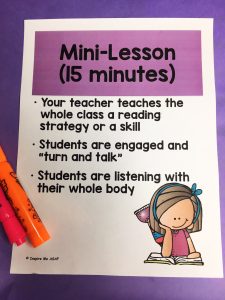
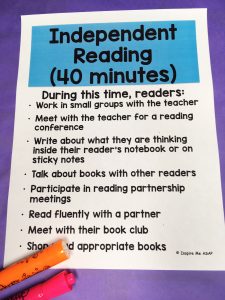
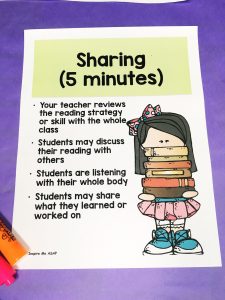
Let’s start with the mini-lesson.
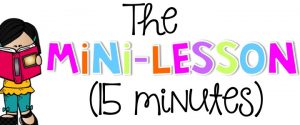
During this time:
*The teacher teaches the whole class a reading strategy or skill
*Students are engaged and “turn and talk”
*Students are listening with their whole body
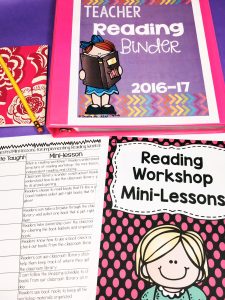
All reading workshop sessions begin with the teacher teaching a reading mini-lesson to the whole class, in a common meeting area. During each mini-lesson, the teacher explicitly models, demonstrates, and teaches a very specific reading skill or strategy. The teacher refers back to a mentor text (more on that in an upcoming chapter!) as he/she teaches a reading specific skill (such as determining importance) or strategy (finding sentences that sum up the main idea.)
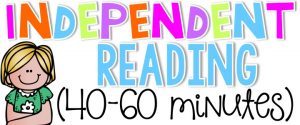
During this time, the students are not “JUST” reading.
During this time, readers:
*Apply the mini-lesson that was taught in the mini-lesson through their independent reading
*Work in a small group with the teacher
*Meet with the teacher for a reading conference
*Write about what they are thinking inside their reader’s notebook or on sticky notes
*Talk about books with other readers
*Participate in reading partnership meetings
*Read fluently with a partner
*Meet with their book club
*Shop for just-right books in the classroom library, on their assigned shopping day
Whew! So many options during this portion of work time! Below is a picture of what a reader’s book nook looks like. All students keep a reader’s notebook, 3-5 just right books, and a reading folder which includes important reading materials such as reading log and stamina chart. You can learn ALL about book nooks in a separate blog post by clicking HERE or on the picture below.
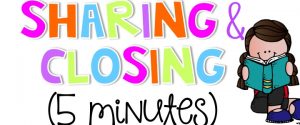
During this time:
*The teacher reviews the reading strategy or skill with the whole class
*Students may discuss their reading with others
*Students are listening with their whole body
All reading workshop sessions conclude with the teacher reviewing the lesson as a whole class in a common meeting area.
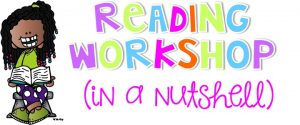
- Readers have the opportunity to TALK about books with their book club and in reading partnerships.
- Readers have a respect and appreciation for books, other readers, and reading time.
- The teacher provides direct and explicit whole group instruction during the mini-lesson and meets with students in small reading groups or individual reading conferences.
- Readers shop for books, understand the importance in taking care of them, and know how to check out books from the classroom library.
- Reading workshop follows a consistent structure- the mini-lesson independent reading, and closing/sharing. Students know exactly what to expect because it is the same routine every day.
- Readers have the opportunity to self-select appropriate books from the classroom library and read these books EVERY DAY.
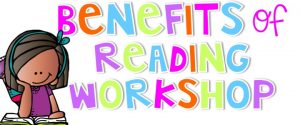
WHY should you want to implement a reading workshop approach for your reading instruction?
- Students are engaged in authentic, meaningful literacy activities. Gone are the countess hours you spend on making, cutting, creating literacy centers. Students are engaged in REAL reading and writing about their reading.
- Students transform into REAL readers, who genuinely get excited for reading time. These readers get excited because their favorite author just released a new book or because they reached their reading goal. They are engrossed with the plots and identify with the characters. They feel sad when the character in their book gets picked on, feel happy when something good happens to the character. The students learn to FEEL emotions as they read.
- Students have choice about the books they choose to read from the classroom library. During guided reading, the teacher selects the texts. During reading workshop time, they do not have anyone telling them what book they are reading. When the students have choice over the books they read, they have a greater sense of ownership over their learning.
I truly believe that ALL students NEED and deserve to have a reading role model- someone that they look up to because they have a PASSION for reading. The **ultimate** goal that I have for every student of mine is that they will experience and develop a love for reading.
Short story that happened last year, and still warms my heart, whenever I think about it. During one of my parent teacher conferences, a parent told me in passing, “The other day (insert child’s name!) told me, ‘you know what dad? There is no such thing a kid who does not like reading. Actually, it is because they didn’t find a book that they love.”
Well, it just so happens that his daughter was referring to a writing prompt that I gave my class one day—see below.
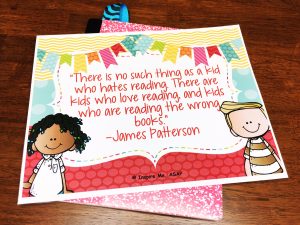
Okay, actually another short story I love to remember from last year.
A parent told me, “I don’t know what you are doing to get these kids to love reading, but my child has absolutely become obsessed with the I Survived series.” On this child’s birthday, she brought a birthday present for the class. She was SO excited to share this present with the class. When she opened up the bag, it was a brand new copy of the latest I Survived book! I was so touched! When a student gets so excited to wrap up a book on their birthday, as a present to the class, you know they get it. They understand that reading is a gift to be treasured.
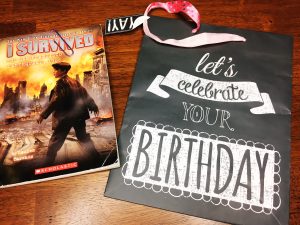
You better believe that this birthday bag was left on our bookshelf, next to the I Survived book bin, ALL year long!!!
What to learn more about Reader’s Workshop?
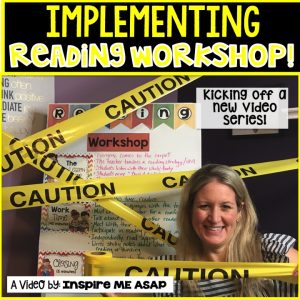
Check out my video series by clicking on the links below!
View my videos on my Teachers Pay Teachers Store: Readers Workshop Video Series
View my videos on my YouTube Store: Reading Workshop Video Series
Reading Workshop in the Primary Classroom Blog Post Series
Take a sneak peak at what is next in this 8 post series!
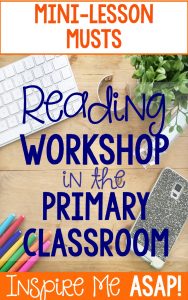
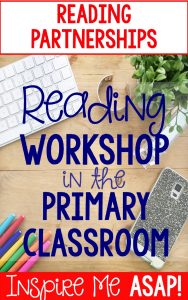
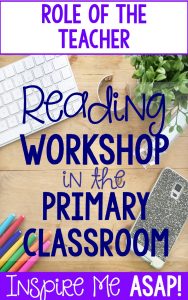
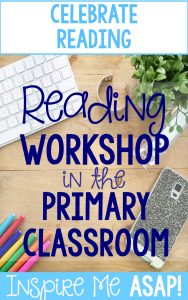
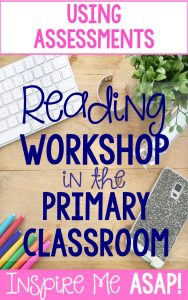
Now, I would LOOVE to hear from you! What is your experience with using reading workshop for your ELA block? How do you feel about it? What guidance and support does your district provide? Do you have any questions for me?
Looking for a reading workshop resource that will help you implement reading workshop in your classroom? Read more about my reading workshop resources listed below.
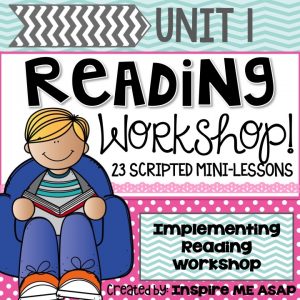
This reading file will help you implement reading workshop in your primary classroom. Looking to implement reading workshop in your primary classroom? This 120 page file has everything you need to know in order to effectively implement a reading workshop approach with your rockin’ readers. More importantly, it will inspire your students to develop a love for reading time.
There are 23 mini-lessons that are included in this file, which focus on establishing routines and setting expectations for implement reading workshop with your students.
During this unit, readers will learn to:
-Follow the structure of reader’s workshop (mini-lesson, independent reading, closing)
-Self-select books that “fit like a glove” from the classroom library
-Take a browse through the classroom library for just-right books
-Take ownership over the classroom library by cleaning book baskets and organizing books
-Use a book check out form to check out books in an organized manner
-Use library stick holders to aid their book shopping
-Use a shopping schedule to check out books on an assigned day
-Use book nooks to keep all their reading materials organized
-Celebrate the grand opening of the classroom library
-Commit to expected reading behavior- RW contract signing party
-Demonstrate specific behaviors of real readers (this includes a fun rockin’ reader art project)
-Build their reading stamina and chart growth
-Use reader notebook’s
-Read with a reading partner during reading partnerships
-Demonstrate expectations for reading partnerships
-Work together to solve problems that arise during reading partnerships
-Read with their partner and discuss the text
-Meet with the teacher for a reading conference
-Reflect on their reading partnerships
Save 10% by purchasing directly from my website.
Or, purchase this resource from my Teachers Pay Teachers store by clicking
This reading workshop (Unit 1) resource is part of my reading workshop bundle.
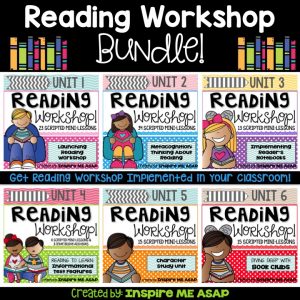
Unit included in this bundle:
Unit 1, Implementing Reading Workshop in your Primary Classroom
Unit 2, Reading Workshop: Reading is Thinking
Unit 3, Implementing Reader’s Notebooks
Unit 4, Informational Text Features
Unit 6, Diving Deep with Book Clubs
Other resources included in this bundle:
Classroom Library Kit
Reading Workshop Book Awards Celebration

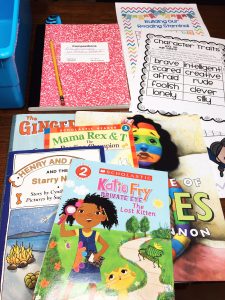
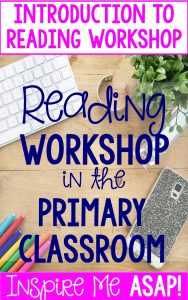
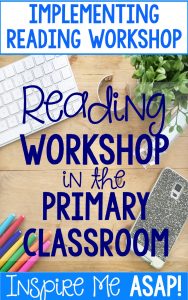
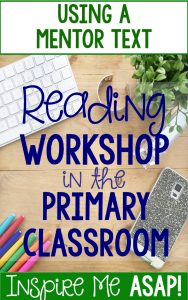
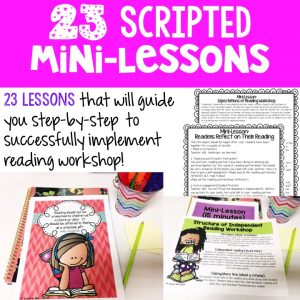
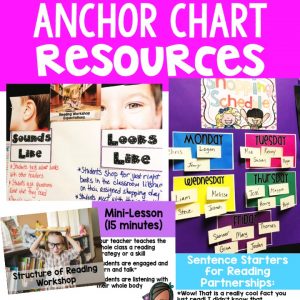
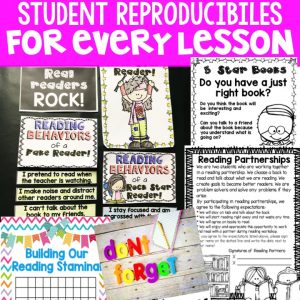

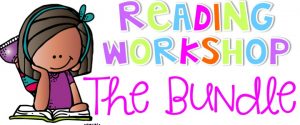

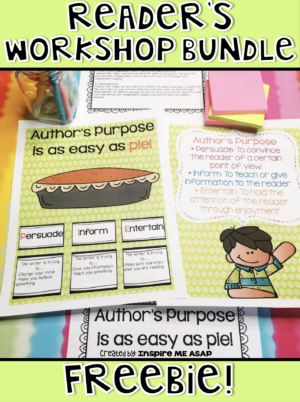

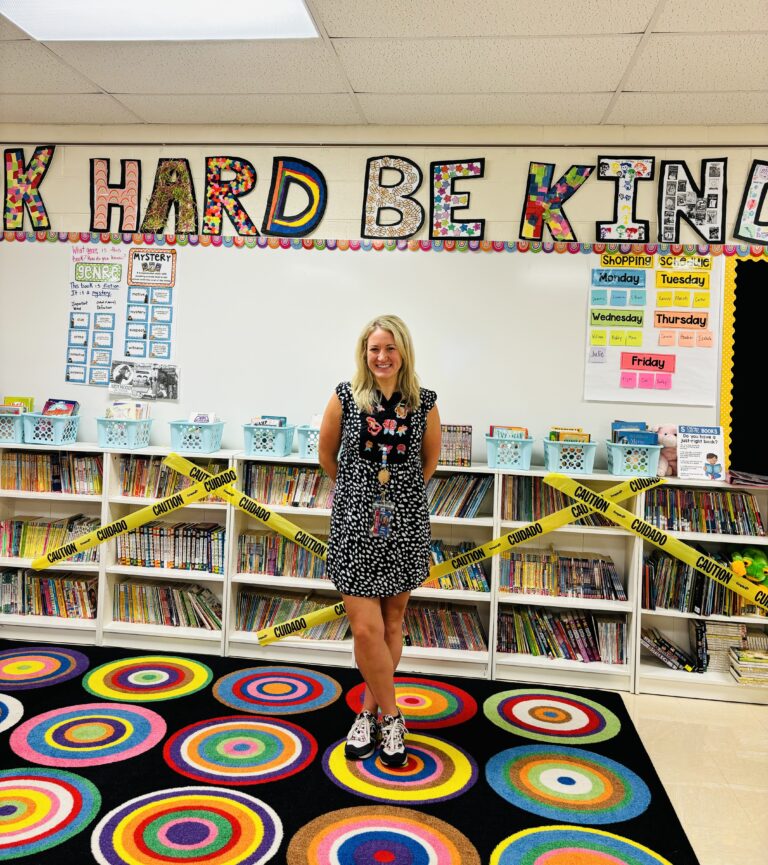



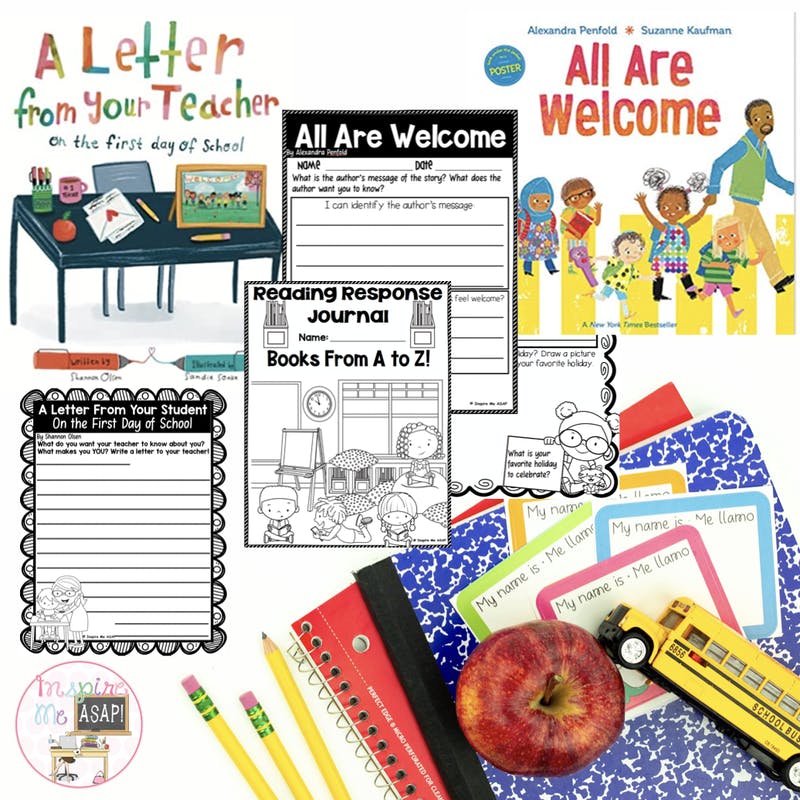
4 Responses
Do you give suggestions for kindergarten, when there are a vast majority of non- or early emergent readers?
Hi Patty, What would you specifically like a suggestion about for kindergarten and reading workshop? I am happy to try and brainstorm ideas with you!
Thanks,
Melissa
Thanks for this. When you run a Reading Workshop for Ks or 1st grade, are you alone in the classroom or are there other adults helping to circulate around the room to support the students in their independent/partner reading and work? Just curious. I’m in 1st grade with lots of ELLs and I find that unless I have another set of hands, I spend my time just managing the space and not being engaged in more meaningful conferencing or observing.
Thanks for any insight —
Jennifer
Hi Jennifer,
Thank you for reading my post and asking your question. I used Reading Workshop with and without other adults in my classroom. Some years I will have a co-teacher and the ELL and social worker “push-in” during RW. Other years, I have no other teachers besides myself in the classroom. Either way, reading workshop is successful because I spend about 6 weeks at the beginning of each school year on procedural based mini-lessons. Once my students understand exactly what their job is during independent work time, then I am able to conference one on one and / or meet with guided reading groups.
You may be interested in joining my new reading workshop membership that I am launching this month. You can learn more about this membership here, and sign up for the watiting list: https://inspiremeasap.com/shop/inspiring-all-readers-club
In a nutshell, the club is for helping teachers implement and maintain a successful reading workshop :)
I hope that helps!
Take care,
Melissa